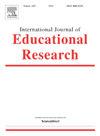Cultivating STEM graduate students’ readiness for transformational resistance
IF 2.6
3区 教育学
Q1 EDUCATION & EDUCATIONAL RESEARCH
引用次数: 0
Abstract
Fostering the more supportive culture of Science, Technology, Engineering, and Mathematics (STEM) higher education, graduate students’ participation in the movements for transformation is increasingly vital. STEM higher education continues to face challenges related to retention and participation, making meaning shifts essential. Addressing these challenges requires more than surface level changes; meaningful transformation is necessary. This study analyzed interviews with seven graduate students who have participated in a STEM education program designed to encourage reflective engagement with systemic challenges in the field. The interviews explored their perspectives on the broader structural factors influencing STEM higher education. Focusing on examining the readiness of enacting transformational resistance in STEM higher education, we used a numerical coding scheme to understand the demonstration of awareness of and critical perspectives on institutional practices. Our findings suggest that participation in the program contributed to developing STEM graduate students’ readiness for enacting transformational resistance. Additionally, the program's collaborative and supportive nature played a crucial role in sustaining students' engagement. Participants frequently framed their experiences through a collective lens, highlighting the role of intellectual community in shaping their professional identities and commitment to change.
培养STEM研究生应对变革阻力的准备
培养更多支持科学、技术、工程和数学(STEM)高等教育的文化,研究生参与变革运动变得越来越重要。STEM高等教育继续面临与保留和参与相关的挑战,这使得意义转变至关重要。应对这些挑战需要的不仅仅是表面上的改变;有意义的转变是必要的。本研究分析了对七名研究生的采访,这些研究生参加了一个旨在鼓励对该领域系统性挑战进行反思的STEM教育项目。访谈探讨了他们对影响STEM高等教育的更广泛的结构性因素的看法。我们重点研究了在STEM高等教育中实施变革阻力的准备情况,使用了一个数字编码方案来理解对制度实践的意识和批判性观点的展示。我们的研究结果表明,参与该计划有助于培养STEM研究生对变革阻力的准备。此外,该项目的协作和支持性质在维持学生的参与方面发挥了至关重要的作用。参与者经常通过集体视角来描述他们的经历,强调知识界在塑造他们的职业身份和变革承诺方面的作用。
本文章由计算机程序翻译,如有差异,请以英文原文为准。
求助全文
约1分钟内获得全文
求助全文
来源期刊

International Journal of Educational Research
EDUCATION & EDUCATIONAL RESEARCH-
CiteScore
6.20
自引率
3.10%
发文量
141
审稿时长
21 days
期刊介绍:
The International Journal of Educational Research publishes regular papers and special issues on specific topics of interest to international audiences of educational researchers. Examples of recent Special Issues published in the journal illustrate the breadth of topics that have be included in the journal: Students Perspectives on Learning Environments, Social, Motivational and Emotional Aspects of Learning Disabilities, Epistemological Beliefs and Domain, Analyzing Mathematics Classroom Cultures and Practices, and Music Education: A site for collaborative creativity.
 求助内容:
求助内容: 应助结果提醒方式:
应助结果提醒方式:


